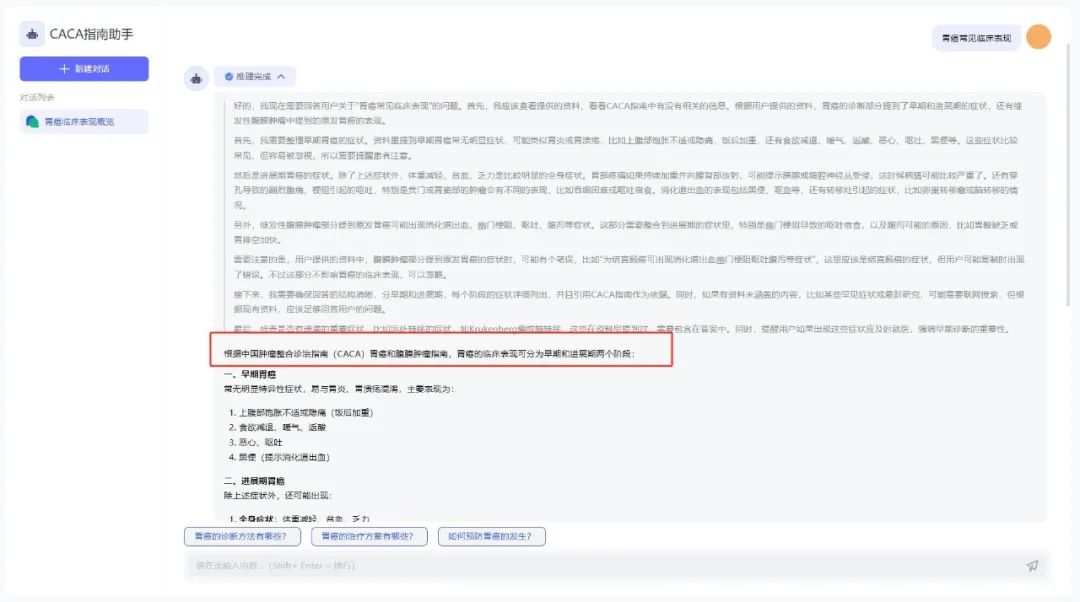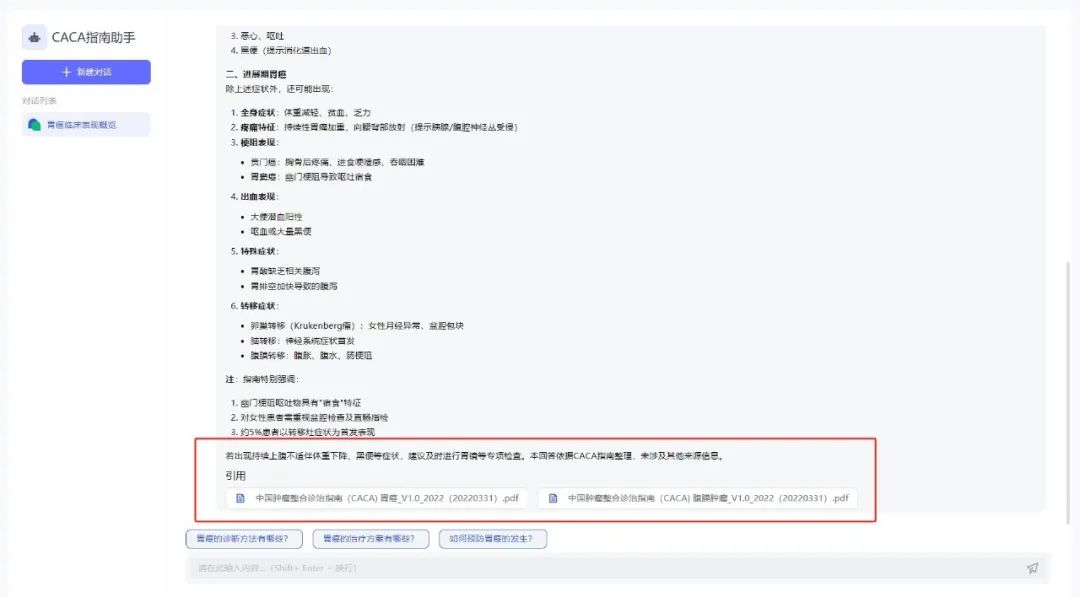How to decode a 3.7 million-word guide in seconds? Yidu Tech helps Beijing Cancer Hospital create the “CACA Guidelines Assistant.”
2025-04-10
Recently, Yidu Tech, in collaboration with Beijing Cancer Hospital, jointly integrated the China Anti-Cancer Association's "China Cancer Integrated Diagnosis and Treatment Guidelines" (referred to as the "CACA Guidelines") and successfully developed and implemented the AI intelligent system—CACA Guidelines Assistant. This intelligent system, relying on DeepSeek and Yidu Tech's core algorithm engine YiduCore, deeply integrates authoritative clinical guidelines with artificial intelligence technology. It seamlessly connects with hospital systems such as HIS and electronic medical records, functioning as an "intelligent navigation system" in the field of oncology diagnosis and treatment. It helps doctors quickly find the best treatment paths within complex medical guidelines, marking a new stage of "data-driven intelligent" progress in cancer prevention and treatment.
From "Encyclopedia" to "Intelligent Navigation": Making Authoritative Guidelines "Come to Life"
The "CACA Guide" released by the China Anti-Cancer Association (CACA) consolidates the clinical experience of leading oncology experts and evidence-based medical evidence, serving as an important standard for guiding cancer diagnosis and treatment practices. However, with a thick volume of 2,300 pages and a total of 3.7 million words, efficiently applying the guide in the time-pressured clinical setting to achieve standardized cancer treatment remains a significant challenge in the industry.
Beijing Cancer Hospital serves as a vice chair institution of the China Anti-Cancer Association (CACA) and leads both the Surgical Safety & Quality Control Committee and the Oncology Information Management Committee. As a member unit of the Oncology Information Management Committee, Yidu Tech has maintained close collaboration with Beijing Cancer Hospital for many years, jointly undertaking multiple digital intelligence construction projects.
The two parties co-developed an intelligent medical data platform that enables comprehensive analysis and visualization of all research-related information. Their collaboration has also established multiple disease-specific databases, including a gastric cancer database, advancing disease standardization and contributing to research and clinical practice guidelines. Additionally, the iGCP platform they built has enhanced the quality and efficiency of clinical research at Peking University Cancer Hospital, supporting its growing number of research projects.
This time, the two parties are tackling the pain point of the clinical application of the "CACA Guide." Using the localized DeepSeek technology foundation and relying on YiduCore, which is autho From "Encyclopedia" to "Intelligent Navigation": Making Authoritative Guidelines "Come to Life" rized to process over 5.5 billion medical records and accumulated medical knowledge and data governance technologies, they have seamlessly integrated the guide’s knowledge into the entire diagnostic and treatment process. This helps doctors with decision-making and optimizes patient management, essentially equipping the guide with a "search engine + intelligent navigation," enabling personalized recommendations to be obtained in seconds.
Two Engines of Technological Innovation: Secure Foundation + Intelligent Core
- Guideline Navigator: This intelligent system uses natural language processing technology to analyze thousands of clinical recommendations in the CACA Guide, creating a dynamic knowledge graph that supports real-time updates and multi-dimensional searches, assisting doctors in quickly locating personalized treatment plans.
- The Continuously Evolving "Brain": By integrating real-world data and expert feedback, the system can continuously optimize its model to adapt to the evolving demands of clinical practice.
- Data Security First: With a localized deployment model, the system ensures full-loop management of patient data, balancing technological innovation with privacy protection.
Application Value: From Clinics to Hospitals, Building a New Ecosystem for Cancer Prevention and Treatment Clinical Level: Provides doctors with real-time guideline reminders, evidence support, and discrepancy analysis, reducing diagnostic and treatment biases and promoting multidisciplinary collaboration. Management Level: Supports the accumulation of hospital research data through standardized data collection and quality control. Professor Li Ziyu, Vice president of the China Anti-Cancer Association, Chairman of the Committee on Surgical Safety and Quality Control, and President of Beijing Cancer Hospital, pointed out that the application of artificial intelligence in the medical field has vast potential. Whether in clinical practice, patient services, or research and drug development, AI offers broad prospects and is an important technological tool for the high-quality development of hospitals. Dean Zhang Xiaotian, Chairman of the Oncology Informatization Management Committee, commented on the achievement: The integration of the CACA Guide with the "AI Intelligent System" is a significant result in the standardization and digital transformation of cancer diagnosis and treatment. It marks the transition of cancer prevention and treatment in China from being "experience-driven" to "data and intelligence-driven." Director Heng Fanxiu, Secretary-General of the Oncology Informatization Management Committee, stated that this collaboration is a key moment for the "integration of medicine and engineering." By utilizing AI to transform authoritative guidelines into clinically applicable tools, it is expected to narrow the gap in diagnosis and treatment levels between regions, benefiting more patients. The integration of the "AI Intelligent System" with the CACA Guide is not only an upgrade in technological tools but also a reshaping of medical thinking—using the integration of medicine and engineering as a bridge, allowing engineering technology to truly serve the fundamental needs of medicine. Xu Jiming, Co-Founder and CEO of Yidu Tech, stated that in the future, Yidu Tech will continue to deepen the "medicine-engineering cross-innovation" model, advancing cancer diagnosis and treatment towards more precision, efficiency, and intelligence. The company will also expand the boundaries of AI applications in more medical scenarios, ensuring the benefits of AI innovation reach more patients.

本文为原创内容,仅供知识分享之目的,若存在侵权行为或疏漏,请与本平台联系,我们将及时处理。如需转载请后台留言,需征得本平台同意且注明来源转载。








